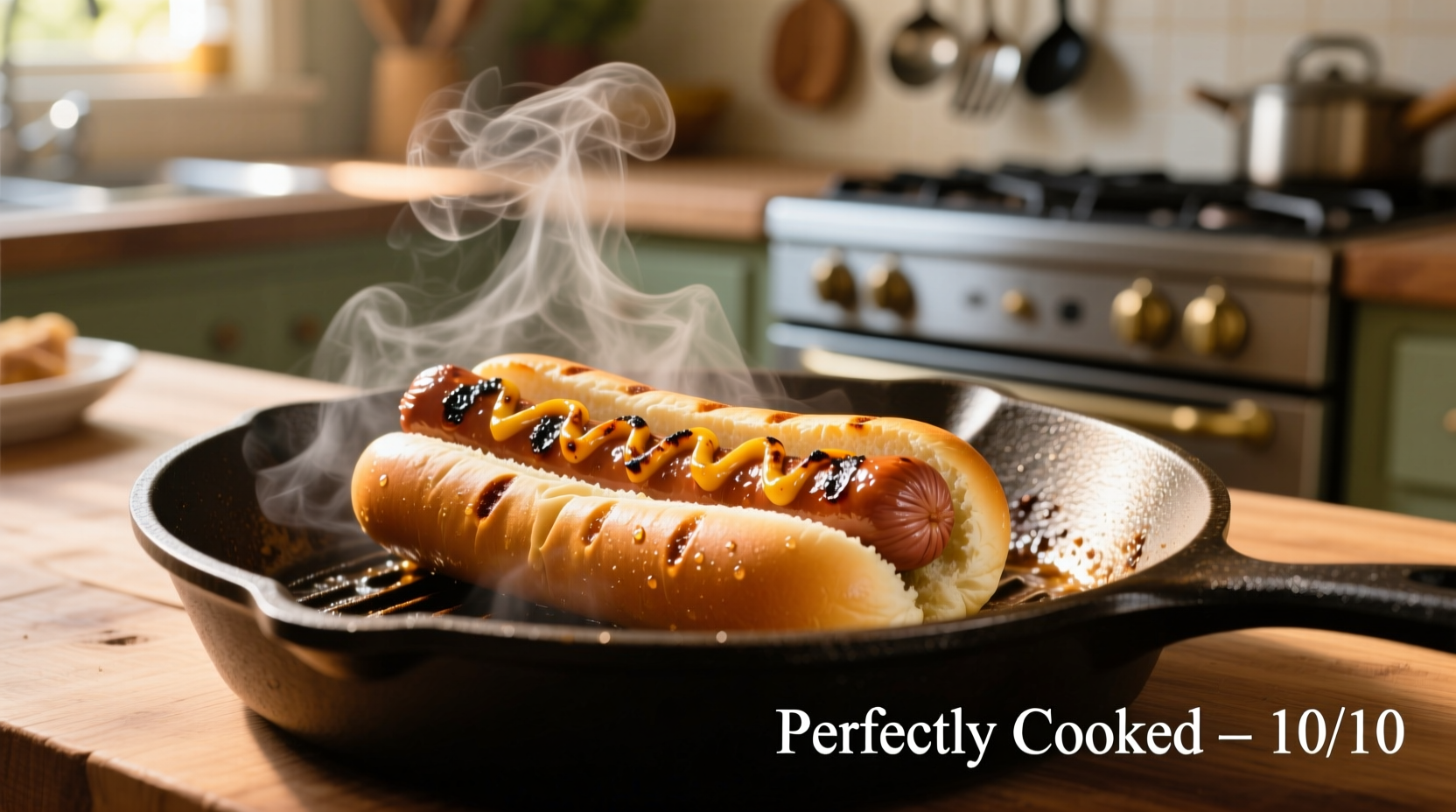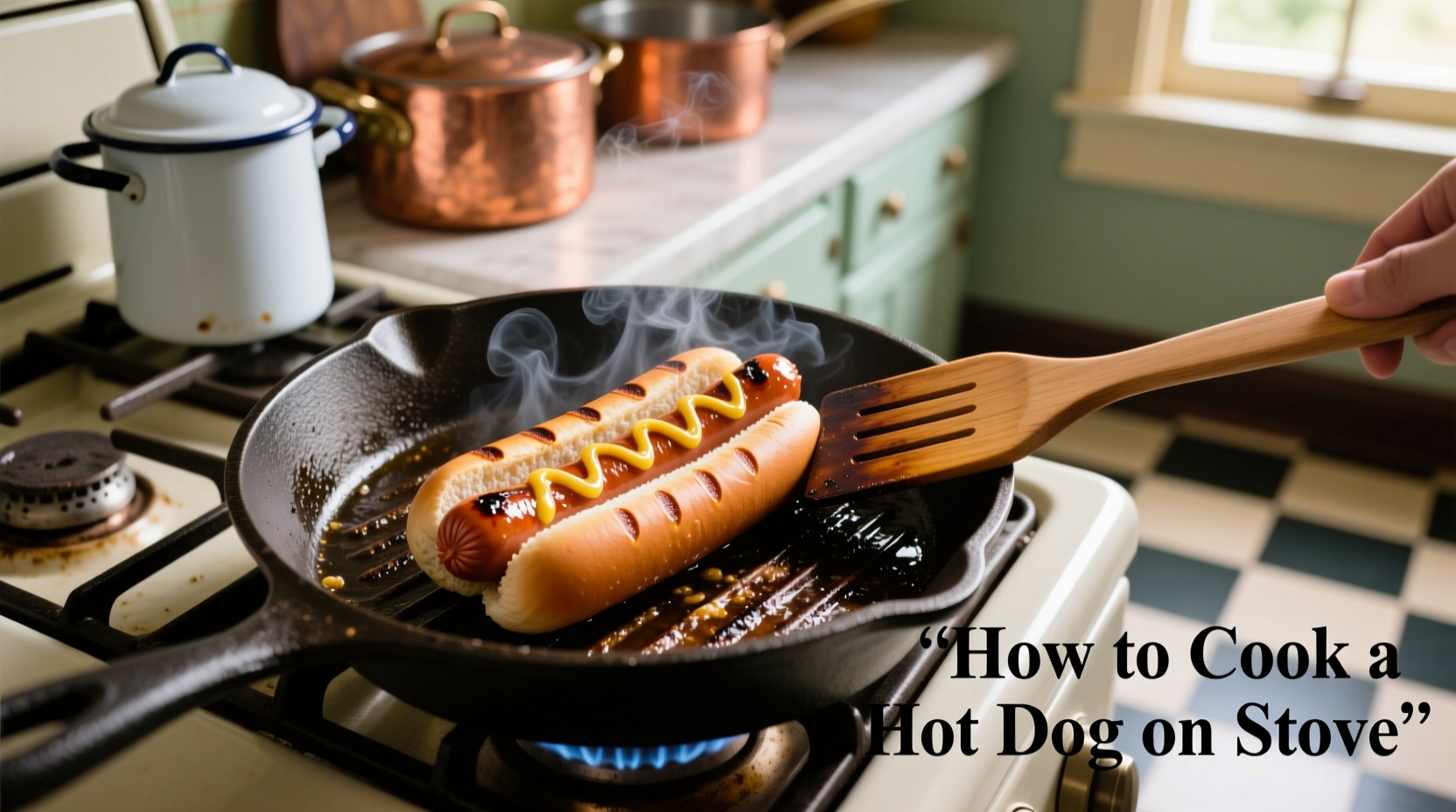Why Stove Top Beats Other Cooking Methods
While grilling remains popular for hot dogs, stove-top cooking delivers consistent results regardless of weather conditions. According to the USDA Food Safety and Inspection Service, cooking hot dogs to 160°F destroys potential pathogens like Listeria that may contaminate processed meats. The stove method provides precise temperature control that prevents the common problem of burst casings seen with boiling or microwaving.
Essential Equipment Checklist
You need minimal equipment for perfect stove-top hot dogs:
- Medium skillet or frying pan (8-10 inches)
- Wooden tongs or fork
- Instant-read thermometer (recommended)
- Plate lined with paper towels
| Cooking Method | Time Required | Texture Result | Safety Consideration |
|---|---|---|---|
| Stove Top (water method) | 5-7 minutes | Plump, evenly heated | Reaches 160°F consistently |
| Boiling | 4-6 minutes | Waterlogged, split casing | Uneven heating possible |
| Grilling | 8-10 minutes | Charred exterior, uneven heat | Risk of flare-ups causing charring |
| Microwave | 1-2 minutes | Soggy, rubbery texture | Cold spots possible |
Step-by-Step Cooking Process

Preparation Phase (1 minute)
Remove hot dogs from packaging and pat dry with paper towels. This critical step improves browning and prevents excess moisture from diluting the cooking water. Never pierce hot dogs before cooking - this allows juices to escape and causes dryness.
Cooking Execution (5-7 minutes)
- Pour 1/4 inch of water into your skillet and place over medium heat
- Arrange hot dogs in single layer without crowding
- Cover skillet with lid to trap steam
- After 2 minutes, rotate hot dogs 180 degrees
- Check internal temperature at 5 minutes using thermometer
- Continue cooking 1-2 minutes more if needed to reach 160°F
Finishing Touches (30 seconds)
Transfer cooked hot dogs to paper towel-lined plate to absorb excess moisture. For enhanced flavor, place back in the dry skillet over medium-high heat for 30-60 seconds to develop slight caramelization. This two-stage method delivers the ideal combination of plump interior and slightly crisp exterior.
Avoiding Common Mistakes
Food safety experts at the FDA emphasize these critical precautions:
- Never use high heat - causes casing rupture and uneven cooking
- Don't skip the water - dry cooking leads to burnt exteriors before interiors reach safe temperature
- Avoid overcrowding - prevents proper steam circulation needed for even heating
- Discard leftovers after 2 hours - processed meats spoil quickly at room temperature
Flavor Enhancement Options
While plain hot dogs work well with this method, consider these professional chef techniques:
- Add 1/4 cup of beer or broth to the water for subtle flavor infusion
- Include 1/2 teaspoon of onion powder in the cooking water
- Finish with a light sear in 1/2 tablespoon of butter for richer flavor
- Toast buns in the same skillet after cooking hot dogs
Special Considerations for Different Hot Dog Types
Not all hot dogs cook identically. The North American Meat Institute notes that:
- Natural casing dogs require more careful temperature monitoring
- Skinless varieties cook slightly faster (reduce time by 1 minute)
- Chicken or turkey hot dogs need precise 165°F internal temperature
- Larger diameter gourment hot dogs may need 8-9 minutes total
Perfect Pairings and Serving Suggestions
Serve immediately after cooking for best texture. The optimal serving window is within 5 minutes of completion, as hot dogs begin losing moisture and texture quality thereafter. Traditional pairings include:
- Steam-softened buns (never toasted dry)
- Classic yellow mustard or whole grain varieties
- Finely diced onions sautéed in the same pan
- Crisp dill pickle spears on the side
How do I know when hot dogs are fully cooked on the stove?
Hot dogs are fully cooked when they reach 160°F internal temperature as measured by a food thermometer. Visually, they'll appear plump with no wrinkling, and the skin will have a slight sheen without splitting. The cooking process typically takes 5-7 minutes using the water method in a covered skillet over medium heat.
Can I cook frozen hot dogs directly on the stove?
Yes, but add 2-3 minutes to the cooking time. Place frozen hot dogs in the skillet with 1/4 inch of water, cover, and cook over medium heat for 7-9 minutes, turning occasionally. The water method safely thaws and cooks simultaneously while preventing the exterior from overcooking before the interior reaches safe temperature.
Why shouldn't I boil hot dogs instead of using the stove method?
Boiling hot dogs causes several problems: it leaches flavor from the meat, makes casings rubbery, and often results in split skins due to rapid temperature changes. The stove-top water method uses steam to gently heat the hot dogs, preserving their texture and flavor while ensuring even cooking to the required 160°F internal temperature for food safety.
What's the best way to prevent hot dogs from splitting while cooking?
To prevent splitting, never pierce hot dogs before cooking, use medium heat (not high), and employ the water method with a covered skillet. The gentle steam environment allows even heating without creating pressure build-up inside the casing. Patting hot dogs dry before cooking also helps maintain casing integrity by preventing sudden steam explosions when they hit the hot surface.
How long can cooked hot dogs stay safe at room temperature?
According to USDA guidelines, cooked hot dogs should not remain at room temperature for more than 2 hours. In environments above 90°F, this drops to just 1 hour. Bacteria grow rapidly between 40°F and 140°F, so prompt refrigeration of leftovers is essential. Store cooled hot dogs in airtight containers for up to 4 days in the refrigerator.











 浙公网安备
33010002000092号
浙公网安备
33010002000092号 浙B2-20120091-4
浙B2-20120091-4